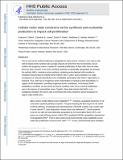Cellular redox state constrains serine synthesis and nucleotide production to impact cell proliferation
Author(s)
Diehl, Frances F.; Lewis, Caroline A.; Fiske, Brian Prescott; Vander Heiden, Matthew G.
DownloadAccepted version (1.209Mb)
Open Access Policy
Open Access Policy
Creative Commons Attribution-Noncommercial-Share Alike
Terms of use
Metadata
Show full item recordAbstract
The de novo serine synthesis pathway is upregulated in many cancers. However, even cancer cells with increased serine synthesis take up large amounts of serine from the environment1, and we confirm that exogenous serine is needed for maximal proliferation of these cells. Here we show that even when enzymes in the serine synthesis pathway are genetically upregulated, the demand for oxidized NAD+ constrains serine synthesis, rendering serine-deprived cells sensitive to conditions that decrease the cellular NAD+/NADH ratio. Further, purine depletion is a major consequence of reduced intracellular serine availability, particularly when NAD+ regeneration is impaired. Thus, cells rely on exogenous serine consumption to maintain purine biosynthesis. In support of this explanation, providing exogenous purine nucleobases, or increasing NAD+ availability to facilitate de novo serine and purine synthesis, rescues maximal proliferation even in the absence of extracellular serine. Together, these data indicate that NAD+ is an endogenous limitation for cancer cells to synthesize the serine needed for purine production to support rapid proliferation.
Date issued
2019-09Department
Koch Institute for Integrative Cancer Research at MITJournal
Nature Metabolism
Publisher
Springer Science and Business Media LLC
Citation
Diehl, Frances F. et al. "Cellular redox state constrains serine synthesis and nucleotide production to impact cell proliferation." Nature Metabolism 1, 9 (September 2019): 861–867 © 2019 The Author(s)
Version: Author's final manuscript
ISSN
2522-5812